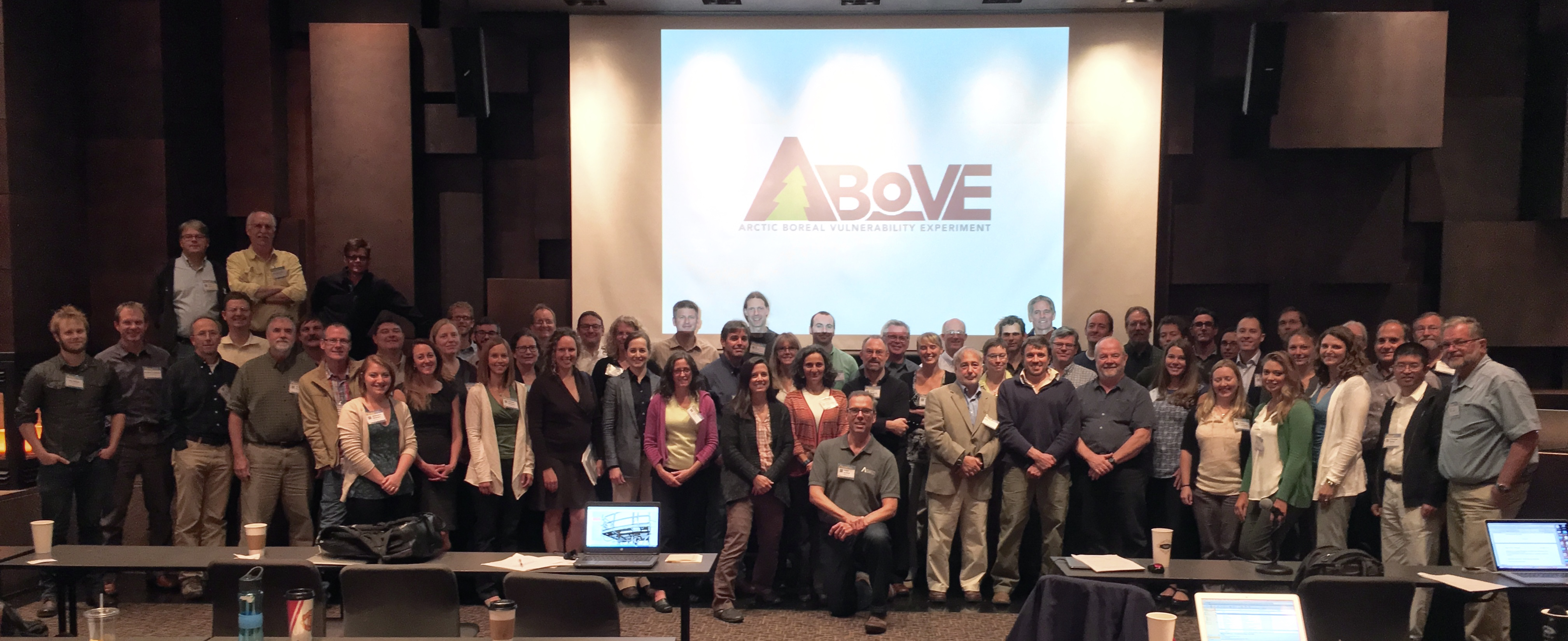|
Tuesday, September 29: The Commons Hotel
|
| 9:00 AM |
Plenary --Pinnacle Ballroom |
|
| 9:00 AM |
Introduction and Welcome |
Scott Goetz/Chip Miller/Peter Griffith |
| 9:15 AM |
Objectives |
Scott Goetz |
| 9:45 AM |
View from HQ |
Hank Margolis/Eric Kasischke |
| 10:15 AM |
Overview of the Science Team |
Peter Griffith |
| 10:30 AM |
BREAK |
|
| 10:45 AM |
Fauna & Ecosystem Services |
|
| 10:45 AM |
Animals on the move: Remotely based determination of key drivers influencing movements and habitat selection of highly mobile fauna throughout the ABoVE study domain >> |
Natalie Boelman |
| 11:00 AM |
Biophysical drivers and socio-ecological impacts of environmental change in the Yukon-Kuskokwim Delta region, western Alaska >> |
Gerald Frost |
| 11:15 AM |
Assessing Alpine Ecosystem Vulnerability to Environmental Change Using Dall Sheep as an Iconic Indicator Species >> |
Laura Prugh |
| 11:30 AM |
Biophysical Characteristics and Mechanisms of Environmental Disturbances Influencing Human Access to Ecosystem Services in Boreal Alaska >> |
Todd Brinkman |
| 11:45 AM |
DISCUSSION |
Natalie Boelman |
| 12:00 PM |
LUNCH |
|
| 1:15 PM |
Vegetation Structure & Function |
|
| 1:15 PM |
Fingerprinting Three Decades of Changes in Interior Alaska (1982-2014) Using Field Measurements, Stereo Air Photos, and G-LiHT Data >> |
Bruce Cook/ Doug Morton |
| |
A Joint USFS-NASA Pilot Project to Estimate Forest Carbon Stocks in Interior Alaska by Integrating Field, Airborne and Satellite Data >> |
Doug Morton |
| 1:30 PM |
LiDAR, passive spectral, and ecophysiological approaches to link Forest Tundra Ecotone structure and function >> |
Jan Eitel |
| 1:45 PM |
A High-Resolution Circumpolar Delineation of the Forest-Tundra Ecotone With Implications for Carbon Balance >> |
Jon Ranson |
| 2:00 PM |
Changes in Shrub Abundance in Arctic Tundra from the Satellite High Resolution Record for the Arctic-Boreal Vulnerability Experiment and Impacts on Albedo >> |
Mark Chopping |
| 2:15 PM |
DISCUSSION |
Doug Morton |
| 2:30 PM |
Vegetation Dynamics & Distribution |
|
| 2:30 PM |
Mapping and modeling attributes of an arctic – boreal biome shift: Resource management implications within the ABoVE domain >> |
Scott Goetz |
| 2:45 PM |
Shifting Patterns of Boreal Forest Succession and Browning Over the Last 30 Years >> |
Michael Goulden |
| 3:00 PM |
Landscape-Scale Histories and Active Monitoring of Disturbance, Seasonality and Greenness Trends for ABOVE from Landsat >> |
Curtis Woodcock/ Mark Friedl |
| 3:15 PM |
Recovery and Archiving of Key Arctic Alaska Vegetation Map and Plot Data for Long-Term Vegetation Analyses >> |
Skip Walker |
| 3:30 PM |
CHARS Experimental and Reference Area (ERA) & Associated Projects >> |
Donald McLennan |
| 3:45 PM |
DISCUSSION |
Michael Goulden |
| 4:00 PM |
BREAK |
|
| 4:15 PM |
Fire Disturbance |
|
| 4:15 PM |
Understanding the Vulnerability and Resiliency of Boreal-Taiga Ecosystems to Wildfire in a Changing Climate: A study of the 2014 Northwest Territories Wildfires >> |
Laura Bourgeau-Chavez |
| |
Planning and Collection of Data on Boreal Wildfire Effects:
Studies of broad-scale 2014 Wildfires in NWT, Canada >> |
Laura Bourgeau-Chavez |
| 4:30 PM |
Quantifying long-term impacts of single and repeated wildfire burning in North American tundra on organic soil carbon stocks and ecosystem functioning >> |
Tatiana Loboda |
| |
Long-Term Multi-Sensor Record of Fire Disturbances in High Northern Latitudes >> |
Tatiana Loboda |
| 4:45 PM |
Increasing fire severity and the loss of legacy carbon from forest and tundra ecosystems of northwestern North America >> |
Michelle Mack |
| 5:00 PM |
Developing a spatially-explicit understanding of fire-climate forcings and their management implications across the ABoVE domain >> |
Brendan Rogers |
| 5:15 PM |
DISCUSSION |
Michelle Mack |
| 5:30 PM |
Adjourn |
|


